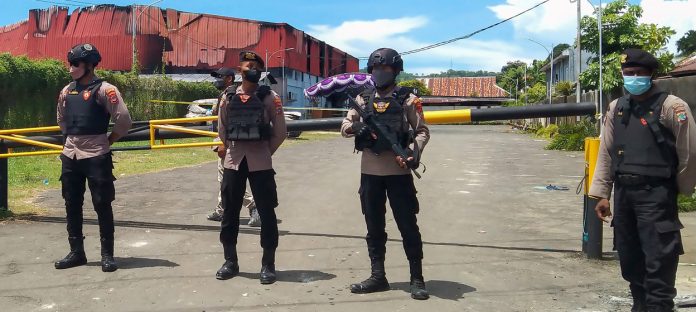Indonesia’s new military chief, General Andika Perkasa, is pursuing a new approach to handling the deteriorating security situation in Papua. During his fit and proper test at the Indonesian parliament in early November 2021, Gen. Perkasa promised he would abandon a combat-heavy approach and replace it with a softer, ‘humanistic approach‘ instead. This move has been publicly supported by Vice President, Ma’ruf Amin, who oversees Papua policies, and the army chief of staff, General Dudung Abdurrachman.
The new approach will see soldiers in Papua doing more civic missions to win the hearts and minds of the Papuans. Apart from carrying out combat missions, soldiers will also function as teachers, healthcare workers, or infrastructure builders. It is hoped that by being closer to the ground, the troops would succeed in persuading tribal leaders not to support the rebel groups.
To operationalise the new approach, existing ‘non-organic combat troops’ in Papua, currently under the command of military units outside Papua, will be reassigned to the army’s Papua regional territorial units.
One problem with this approach is that it is widely known that the military commands in Papua do not have sufficient personnel and territorial units to deal with security disturbances. There would always be a need for non-organic troops from outside Papua. Between 2019 to 2021, according to Hipolitus Wangge, a graduate student at the Australian National University who compiled the data on military deployment, on average, around 9,000 additional troops were deployed per year to Papua.
The existing territorial organisation of the army in Papua, particularly at the district level (Kodim) and below, is woefully inadequate. There are only 22 Kodims in the region. (It is estimated that a Kodim in Papua comprises around 700-900 troops.) Ideally, there should be 60 Kodims in the two Military Regional Commands (Kodam) in Papua. Gen. Perkasa plans to add eight new Kodims in the near future.
To make up for the personnel shortages and reduce dependence on combat forces outside of Papua, so-called “Special Autonomy Non-Commissioned Officers” (NCOs, Bintara Otsus) have been created. The military and police plan to recruit 3,000 indigenous Papuan youths to serve in the police and army. This recruitment program has been underway since early 2020, when Gen. Andika was still the army’s chief of staff. These Special Autonomy NCOs are being educated and trained in Java. They have been “grafted” in Kodims throughout Java to learn about the TNI’s ‘territorial approach’ – which is unique to Indonesia and emphasises the military’s ‘dual-function’ (dwifungsi) doctrine of engaging in both military and civic missions.
Significantly, funding for the training of this Papuan unit is drawn from the Special Autonomy Fund rather than the state budget. It suggests that this move is being driven by the intent to use more indigenous Papuans to deal with Papuan separatism. But herein lies some potential dangers. The creation of the Special Autonomy NCOs has the potential to sow divisions among indigenous Papuans and perpetuate the conflict rather than extinguish it.
Activists and civil society organisations have responded to the shift in security approach with caution and some scepticism. Several organisations, including the National Human Rights Commission, welcomed this plan – partly because there had initially been some misunderstanding in equating the new humanistic approach with the withdrawal of troops from Papua.
Others have been more cynical. Reverend Socrates Yoman, President of the Fellowship of the Baptist Churches of West Papua (PGBWP) said that the move was ‘just a change of clothes’ for the non-organic troops. Similarly, the West Papua National Liberation Army spokesman, Sebby Sambom, did not believe the TNI’s promise to withdraw non-organic troops from Papua and dismissed the humanistic approach as ‘nonsense’.
Putting cynicism aside, any genuine move to de-emphasise combat missions and prioritise civic missions may be a bit of a gamble and premature, because the security situation in Papua has continued to deteriorate. Based on data from the Armed Conflict Location & Event Data Project (ACLED), attacks by the National Liberation Army/Free Papua Organization (TPN/OPM) against the TNI have increased sharply over the past three years.
Number of TPN/OPN Attacks on TNI/Polri, 2015 – 2021
| Year | Number of Attacks |
| 2015 | 12 |
| 2016 | NA |
| 2017 | 13 |
| 2018 | 25 |
| 2019 | 34 |
| 2020 | 73 |
| 2021 | 137 |
Source: ACLED
Usually, the ‘territorial approach’ is carried out only after combat operations are completed successfully. Operations aimed at winning the hearts and minds of the population are usually directed at maintaining military gains obtained after combat operations. The sharp spike in the number of attacks between 2020 and 2021 suggests that the combat operations are far from complete.
It is still too early to measure the success and sustainability of Gen. Perkasa’s shift in security approach for Papua. Furthermore, he has only ten months to fully implement his plans, as he is due to retire at the end of this year. But based on the current realities on the ground, it looks like achieving success could be a long shot.
By Made Supriatma / fulcrum
The views and opinions expressed in this article are solely those of the author and do not necessarily reflect the position of AsiaWE Review.




